初一同步辅导(英语)-第3周
(人教版+朗文)初一英语同步辅导(含同步练习)Unit3NumbersinEnglish

(人教版+朗文)初一英语同步辅导(含同步练习)Unit 3Numbers in English1. 语音元音字母a在重读开闭音节中的读音。
2. 数字zero one two three four five six seven eight nine ten eleven twelve thirteen fourteen fifteen3. 日常交际用语(1)What class are you in?I'm in Class 4, Grade 1.(2)I'm in Row 1, too.(3)I'm Number 3.(4)What's one and two?(5)Are you ten?(6)What's five and three?(7)What's five minus three?(8)It's…二. 教学重、难点:(1)掌握从0~15的数字,能够正确拼读及拼写,学会用英语表达和计算15以内的加、减法。
(2)能理解并掌握动词be(am,is,are)的基本用法,能准确把握它们的完全形式、缩写形式、一般疑问句形式以及肯定、否定两种形式的回答等。
(3)能准确认读元音字母A在重读开音节、闭音节中的读音,初步了解并掌握其基本的拼读规则。
三. 具体内容的讲解与分析:1. 字母a在单词中的读音。
开音节:以发音的元音字母结尾或辅音字母(r除外)+不发音的“e”结尾的音节,叫开音节。
在重读开音节中元音字母发它本身的读音,字母a在开音节中发[ei]。
如:name grade Kate。
闭音节:以一个元音字母+一个辅音字母或几个辅音字母(r除外)结尾的音节,叫闭音节。
在重读闭音节中元音字母a读[ ]。
如:map Ann bag。
2. 英语的音节英语单词是由字母组成的,字母构成音节。
一般来讲有一个元音就是一个音节。
含一个元音的词叫作单音节词,含两个或两个以上元音的单词叫作双音节或多音节词。
(晨读晚练)七年级英语上册 第三周 情感、情绪与人际交往参考答案及解析
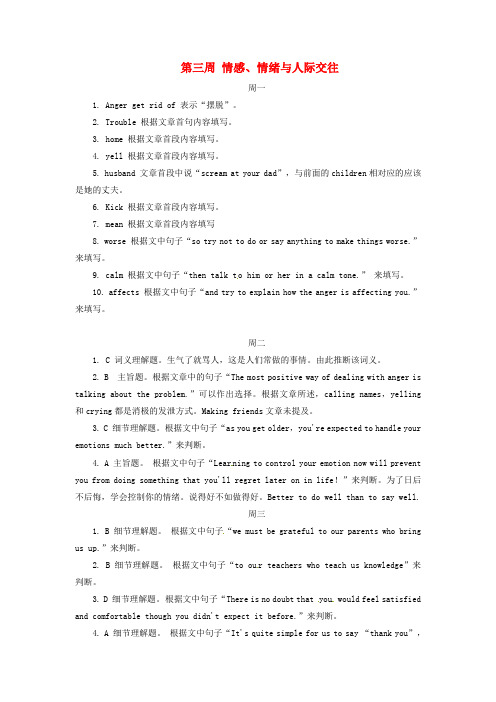
第三周情感、情绪与人际交往周一1. Anger get rid of 表示“摆脱”。
2. Trouble 根据文章首句内容填写。
3. home 根据文章首段内容填写。
4. yell 根据文章首段内容填写。
5. husband 文章首段中说“scream at your dad”,与前面的children相对应的应该是她的丈夫。
6. Kick 根据文章首段内容填写。
7. mean 根据文章首段内容填写8. worse 根据文中句子“so try not to do or say anything to make things worse.”来填写。
9. calm 根据文中句子“then talk t o him or her in a calm tone.” 来填写。
10. affects 根据文中句子“and try to explain how the anger is affecting you.”来填写。
周二1. C 词义理解题。
生气了就骂人,这是人们常做的事情。
由此推断该词义。
2. B 主旨题。
根据文章中的句子“The most positive way of de aling with anger is talking about the problem.”可以作出选择。
根据文章所述,calling names,yelling 和crying都是消极的发泄方式。
Making friends文章未提及。
3. C 细节理解题。
根据文中句子“as you get older,you're expected to handle your emotions much better.”来判断。
4. A 主旨题。
根据文中句子“Lear ning to control your emotion now will prevent you from doing something that you'll regret later on in life!”来判断。
人教版英语七年级上册周周练—第三周
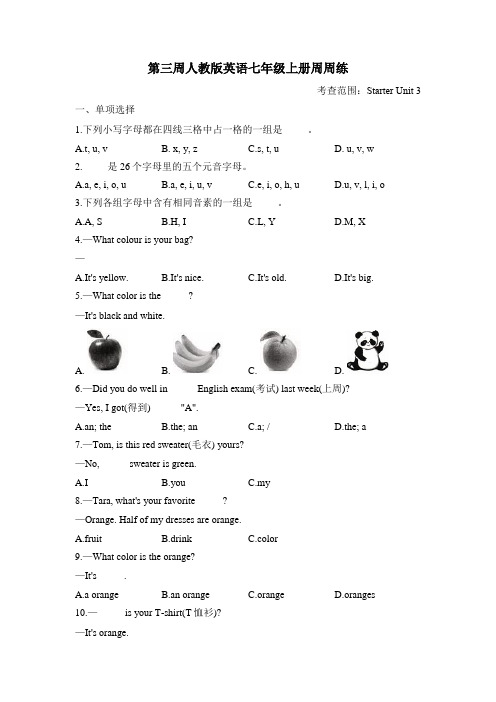
第三周人教版英语七年级上册周周练考查范围:Starter Unit 3一、单项选择1.下列小写字母都在四线三格中占一格的一组是_____。
A.t, u, vB. x, y, zC.s, t, uD. u, v, w2._____是26个字母里的五个元音字母。
A.a, e, i, o, uB.a, e, i, u, vC.e, i, o, h, uD.u, v, l, i, o3.下列各组字母中含有相同音素的一组是_____。
A.A, SB.H, IC.L, YD.M, X4.—What colour is your bag?—_____A.It's yellow.B.It's nice.C.It's old.D.It's big.5.—What color is the _____?—It's black and white.A. B. C. D.6.—Did you do well in _____ English exam(考试) last week(上周)?—Yes, I got(得到) _____ "A".A.an; theB.the; anC.a; /D.the; a7.—Tom, is this red sweater(毛衣) yours?—No, _____ sweater is green.A.IB.youC.my8.—Tara, what's your favorite _____?—Orange. Half of my dresses are orange.A.fruitB.drinkC.color9.—What color is the orange?—It's _____.A.a orangeB.an orangeC.orangeD.oranges10.—_____ is your T-shirt(T恤衫)?—It's orange.A.HowB.What colorC.What's colorD.What二、阅读理解AHello, I'm Frank. What's this? It's a pen. It's my red pen. My black pen is in my bag. My bag is orange. And my key is in it. It's blue. This is my ruler. It's white. It's on my desk(在我的桌子上). And my orange is on the desk, too.1.Frank has (有) pen(s).A.3B.2C.1D.02.There is (有) in Frank's bag.A.a pen and a keyB.a pen and an orangeC.a key anda rulerD.a ruler and a pen3.画线单词"orange"的汉语意思是。
(上海牛津版)初一英语同步辅导(含同步练习)Unit3

(上海牛津版)初一英语同步辅导(含同步练习)Unit3Unit 3相关语法:1、祈使句2、现在进行时态及用法3、情态动词can 的用法及相关句型Unit 3 语言项目[相关语法]一、祈使句:定义:表示命令与请求的句子分类:1、Don’ t + 动词原形→ Don’ t talk. 不许讲话。
2、No +名词→ No photos. 不许拍照。
3、No + 动ing→ No smoking. 禁止吸烟。
4、动词直接开头 Look at the sign. 看标志牌。
二、现在进行时态及用法1、现在分词的变化规律(1)直接在行为动词之后加-ing 。
如: eat- eating , study –studying , work – working, play – playing 等。
(2)以不发音的e结尾的,去e后加- ing 。
如: write – writing, close – closing, come- coming, make – making 等。
若结尾的e 发音,就不能去掉。
如:see - seeing等。
(3)以一个元音字母加上一个辅音字母结尾,且该音节为重读闭音节时,要双写词尾字母,然后加- ing 。
如: get –getting, sit –sitting, run – running, put – putting, swim –swimming, begin –beginning等。
若结尾是元音字母加辅音字母组合,就直接加–ing 。
如:drawing, playing等。
2、现在进行时的句式变化肯定句式:主语+be (am , is , are )+ 现在分词+其它。
否定句式:主语+ be(am, is , are )+ not +现在分词 + 其它。
一般疑问句:Be (Am , Is , Are )+主语+现在分词+其它?特殊疑问句:疑问词+be (am, is , are )+ 主语 + 现在分词+其它?3、在实际运用时,现在进行时常用以下几种情况:(1)当句子中有now时,常表示动作正在进行,这时要用现在进行时。
初一英语陪练第三单元的第三课时的作文应该
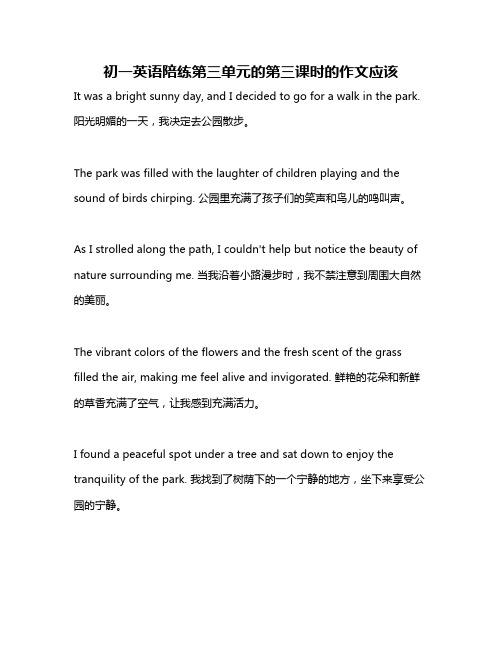
初一英语陪练第三单元的第三课时的作文应该It was a bright sunny day, and I decided to go for a walk in the park. 阳光明媚的一天,我决定去公园散步。
The park was filled with the laughter of children playing and the sound of birds chirping. 公园里充满了孩子们的笑声和鸟儿的鸣叫声。
As I strolled along the path, I couldn't help but notice the beauty of nature surrounding me. 当我沿着小路漫步时,我不禁注意到周围大自然的美丽。
The vibrant colors of the flowers and the fresh scent of the grass filled the air, making me feel alive and invigorated. 鲜艳的花朵和新鲜的草香充满了空气,让我感到充满活力。
I found a peaceful spot under a tree and sat down to enjoy the tranquility of the park. 我找到了树荫下的一个宁静的地方,坐下来享受公园的宁静。
As I closed my eyes and listened to the gentle rustling of leaves, I felt a sense of calm wash over me. 当我闭上眼睛,听着树叶轻柔的沙沙声时,我感到一种平静的感觉涌上心头。
The park was a sanctuary away from the hustle and bustle of city life, and I was grateful for the opportunity to escape and unwind. 公园是一个远离城市喧嚣的避难所,我为能够逃离和放松而感到感激。
七年级上册英语Unit3同步辅导
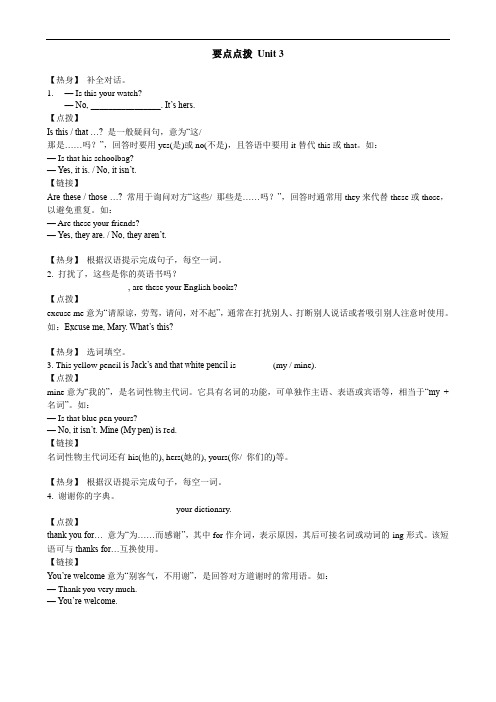
要点点拨Unit 3【热身】补全对话。
1. — Is this your watch?—No, ________________. It’s hers.【点拨】Is this / that …? 是一般疑问句,意为“这/那是……吗?”,回答时要用yes(是)或no(不是),且答语中要用it替代this或that。
如:— Is that his schoolbag?—Yes, it is. / No, it isn’t.【链接】Are these / those …? 常用于询问对方“这些/ 那些是……吗?”,回答时通常用they来代替these或those,以避免重复。
如:— Are these your friends?—Yes, they are. / No, they aren’t.【热身】根据汉语提示完成句子,每空一词。
2. 打扰了,这些是你的英语书吗?_______ _______, are these your English books?【点拨】excuse me意为“请原谅,劳驾,请问,对不起”,通常在打扰别人、打断别人说话或者吸引别人注意时使用。
如:Excuse me, Mary. What’s this?【热身】选词填空。
3. This yellow pencil is Jack’s and that white pencil is ________(my / mine).【点拨】mine意为“我的”,是名词性物主代词。
它具有名词的功能,可单独作主语、表语或宾语等,相当于“my +名词”。
如:— Is that blue pen yours?—No, it isn’t. Mine (My pen) is r ed.【链接】名词性物主代词还有his(他的), hers(她的), yours(你/ 你们的)等。
【热身】根据汉语提示完成句子,每空一词。
4. 谢谢你的字典。
________ ________ ________ your dictionary.【点拨】thank you for… 意为“为……而感谢”,其中for作介词,表示原因,其后可接名词或动词的-ing形式。
(牛津版)初一英语同步辅导(含同步练习)Unit3

(牛津版)初一英语同步辅导(含同步练习)Unit3学习要求:1. 谈论中西方著名的节日和最喜欢的节日2. 熟悉万圣节的知识3. 用正确的介词表达时间4. 用some和any讨论数量5. 学做海报重点与难点的分析讲解1. treat① n. 给人喜悦的事物,乐事,招待,款待This is his treat.Whose treat is it?It’s a great treat to hear you play the piano.② vt. 对待,看待,治疗He treats me as an enemy.Who is treating the old man?2. New Year’s DayChinese New YearSaint Valentine’s DayWomen’s DayApril Fool’s DayMay DayDragon Boat FestivalMother’s DayFather’s DayChildren’s DayTeachers’ DayNational DayMid- Autumn FestivalThanksgiving DayHalloweenChristmas3. finish sth.finish doing sth,David finishes his work at 5 every day.Can you finish writing the letter in the afternoon?4. play a trick on sb.play a joke on sb.His brother likes playing a joke on his classmates. Don’t play a trick on others.5. I am on holiday in New York.be on holidaytake / have a holidayShe will take a holiday next month.go on holidayWe’ll go on holiday at the seaside.go to a place for a holidayHe’ll go to Japan for a holiday.be on business be on firebe on show/ display be on salebe on a visit6. People celebrate Halloween in many ways. way 方法,方面You can learn English well in this way.We work out the problem in different ways.in a way在某种程度上He is right in a way.in no way决不,一点不The magazine is in no way interesting.7. learn to do sth.learn how to do sth.He is learning how to swim.The baby is learning to speak.8. want sb. to do sth.The teacher wants you to do the same thing.would like sb. to do sth.Would you like me to do it for you?四. 语法重点1. prep. of time①on + 具体的某一天/ 某天的上午、下午、晚上/ 平时(工作日)on the first of March on Mondayon Tuesday afternoon on the evening of the 4thon Christmas Eve on weekdays②in + 年/ 季节/ 月/ 周/ 上午、下午、晚上in 2003 in springin December in the morning/ afternoon/ eveningin the first week of this term③at + 某一时刻/ 年龄/ 周末/ 就餐时间/ 节日/ 黎明、正午、午夜at seven o’clock at half past eightat daybreak / noon/ night at lunchtimeat breakfast at weekendsat Christmas at 16 (at the age of 16)④时间状语被下面的词修饰时,前面不用介词this / these next/ last yesterday/ tomorrowa / one / every / some / allthese days this year next week last month every Wednesday one day some day tomorrow morninglast night yesterday evening2. some / any①some/ any + 可数名词的复数some/ any teachers some/ any treessome/ any people some/ any boys②some/ any + 不可数名词some/ any water some/ any moneysome/ any rice some/ any paper用法:①在肯定句中用some②在否定句中用any③在疑问句中,如果表示征询意见或建议,并且希望得到肯定回答,用some如果问存不存在、有没有,用anyWould you like some tea?Can I have some juice?【模拟试题】(答题时间:60分钟)一. 阅读理解专练(A)The day was like any other day in his life, Tom walked past the shop on the street corner. He stopped to look at the front row of shoes, and he felt happy to see that the pair of shoes he wanted very much were still there. Looking down, he felt sorry for himself. He really wanted to have them for his birthday.He sadly walked away and thought how to tell his mother about it. He knew she would give him anything he liked if she could. But he also knew very well she had little money. He decided not to go home at once, as he looked worried and his mother would notice (注意) it. So he went to the park and sat on the grass. Then he saw a boy in a wheel chair (轮椅) . He noticed that the boy moved the wheel with his hands. Tom looked at him carefully and was surprised to see the boy have no feet. Helooked at his own feet. “It's much better to be without shoes than without feet, ” he thought. There was no reason (理由) for him to feel so sorry and sad. He sent away and smiled, thinking he was happier.1. Tom passed the shop______.A. on footB. by busC. by bikeD. in a car2. Why did T om stop in front of the shop? Because he wanted______.A. to buy the shoesB. to look at the shoes he likedC. to look at the shoes in the shop windowD. to look at the shoes on the front row3. The pair of shoes he liked was ______.A. too expensiveB. quite cheapC. not thereD. not sold yet4. Tom went into the park because he______.A. was thinking how to tell his mother about itB. wanted to see the boyC. didn't want to make his mother worriedD. he felt sad5. From the story we can know that Tom______.A. liked new shoes very muchB. loved his mother bestC. didn't want to go to schoolD. didn't want to stay at home(B)People sometimes like to read stories of dogs very much. They think that dogs are much cleverer than cats, sheep, cows orother animals in their homes.One of my close friends, Bob, has a very large police dog named Jack. Every Sunday afternoon, Bob and Jack have a walk in the park nearby. Jack likes these walks very much. One Sunday afternoon, I paid a visit to my friend. I stayed there for a long time and my friend and I had much more talk with each other than ever before. Soon it was time for them to take a walk in the park. We forgot that. Jack became worried about it. He walked around the room several times and then sat down in front of me and looked at me. But I still paid no attention (注意) to him. I went on talking with my friend. At last, Jack could not wait any longer. He went out of the room and came back a few minutes later. He sat down in front of me again. But this time, he held my hat in his mouth. Suddenly, I understood what Jack meant and so did my friend.1. How many people are there in this story?______.A. OneB. TwoC. ThreeD. Four2. Jack______.A. is a close friend of mineB. enjoys long walks in the park every Sunday afternoonC. has many close friendsD. enjoys talks in the room3. Jack was worried because______.A. he wanted to eat somethingB. it was Sunday afternoon againC. he was not feeling wellD. he wanted his master (主人) to take him for a walk4. Jack took my hat in his mouth to show that______.A. I should leave the house at onceB. he liked my hat very muchC. he was hungry and he tried to eat itD. he wanted to have a rest5. Which of the following is true?______.A. When Jack and I were talking, my friend didn't pay any attention to usB. When I was talking to my friend, Jack didn't pay any attention to usC. When my friend and I were talking, we didn't pay any attention to JackD. When my friend was talking to Jack, I paid attention to them(C)Peter was a small boy. He lived with his parents in a small house near some hills. The people there were all poor.One night it was very dry and windy.When everybody was asleep, Peter suddenly heard some noise. It came out from the kitchen (厨房). He got up and walked to the kitchen. He found that the wood beside the stove (火炉) was burning . There was no water tap (水龙头) in the house , so he could not put out (扑灭) the fire . He shouted loudly to wake up everyone in the house. Then he ran out of his house and knocked on the doors of many houses to wake the people up. They all left their houses quickly.At last the fire was put out by the firemen. Many houses were burnt. But nobody was burnt in the fire.1. Peter lived with his______.A. sistersB. brothersC. unclesD. parents2. One night he found that______ beside the stove was burning.A. the tableB. the woodC. the doorD. thewindow3. ______, so he could not put out the fire.A. Everybody was asleepB. He couldn't shout loudlyC. The kitchen was very bigD. there was no water tap in the house4. Peter knocked on the doors of many houses______.A. to wake the people upB. to get some waterC. to find his classmatesD. to visit them5. ______hurt in the fire.A. People in other houses wereB. Peter's parents wereC. Nobody wasD. Peter was(D)“You're just in time, Joe. We're going to play cowboys(牛仔)a nd Indians, and you can be the Indians. ” One of my cousins said.“How many Indians?” I asked.“Oh, about a thousand. ” He answered, and before I could say no,I was pushed out into the night and became a thousand Indians. Two minutes later I was running in the fields with a group of cowboys behind. The shouts of “After them. Let's catch the killers!” and other such TV play language came into my ears as I ran round a corner and hurried into my Grandpa's car.“We've got him, boys. Let's go and catch him!”But no one wanted to come to get me. All of my cousins except one were always very friendly with. It was quiet outside.And I went out of the car to have a look.Just then I heard a shout , “Bring the rope(绳子), and we can burn him. ”“Only Indians burn people. Cowboys.” I stopped just in time. I had almost said, “Cowboys hang(绞死)people. ”I was tied to a tree, and the cowboys were looking for some wood when my dear mother called, “We're leaving now. ”“Untie me.” I shouted. “We're going.”“Why did Bobby want m atches(火柴)?” Mum asked when we were in the car. “He was asking Dad whether he had any. ”“Oh, he was just looking for matches? MATCHES? Are you sure he wanted matches? ” Mother was quite sure, and I didn't say any more.1. How many children played the Indians?A. One thousand.B. One hundred.C. One group.D. One.2. Why did Joe's cousin say that Joe was just in time? Because______.A. there were not enough children for the gameB. the game was just going to startC. none of his cousins wanted to be the IndiansD. they were waiting for Joe3. Joe didn't say “Cowboys hang people.” Because______.A. he was tied to a treeB. that would make things worseC. he was caught by the cowboysD. that would make the cowboys angry4. Which of the following is TRUE?A. One of Joe's cousins was looking for matches.B. Dad didn't want to give the children any matches.C. Bobby wanted to get some matches from his father.D. Mum didn't think children should play with matches.5. The name of the story should he“______.”A. Joe and his cousinsB. Who knows what danger is waiting thereC. Cowboys and Indians is a favourite children's gameD. How cowboys and Indians fought in the past(E)A very new, young officer was at a station. He was on his way to visit his mother in another town, and he wanted to telephone her to tell her the time of this train , so that she could meet him at the station in her car. He look in all his pockets, but round that he did not have the right money for the telephone, so he went outside and looked around for someone to help him.At last an old soldier came by, and the young officer stopped him and said, “Have you got change(零钱) for ten pence(便士)?”“Wait a moment, ” the old soldier answered. He began to put his hand in his pocket, “I'll see whether I can help you. ”“Don't you know how to speak to an officer?” the young man said angrily. “Now let's start again. Have you got change for ten pence? ”“No, sir,” the old soldier answered quickly.1. The young officer and his mother lived______.A. in the same townB. in different placesC. in another townD. in the other town2. The young officer wanted to telephone his mother to tellher______.A. that he was going to visit herB. where his train would leave forC. what time his train would arrive at the stationD. that he was then at the station3. He looked around for help because he______.A. had no money to make the phone callB. did not know where to make the phone callC. needed some change for the phone callD. wanted to get change from the old soldier4. The young officer was angry because he thought the old soldier______.A. was polite to himB. was not polite to himC. didn't know how to speak to himD. didn't like to help him at all5. Which of the following is not true?A. Both the young officer and the old soldier were angry.B. The young officer wanted his mother to meet him at the station.C. He wanted the old soldier to speak to him in a polite way.D. He didn't know the soldier before.【试题答案】(A)ABDCB (B)CBDAC(C)DBDAC (D)DCBAB(E)BCCBA。
人教新目标七年级英语上册 第三周微测试 Unit 1 含答案
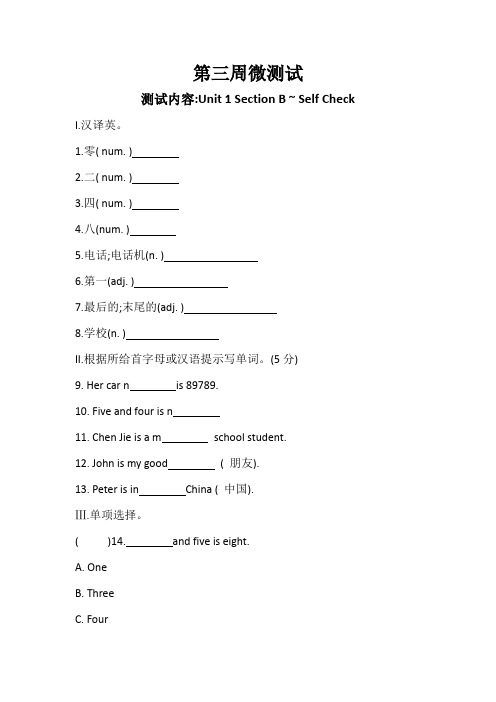
第三周微测试测试内容:Unit 1 Section B ~ Self CheckI.汉译英。
1.零( num. )2.二( num. )3.四( num. )4.八(num. )5.电话;电话机(n. )6.第一(adj. )7.最后的;末尾的(adj. )8.学校(n. )II.根据所给首字母或汉语提示写单词。
(5分)9. Her car n is 89789.10. Five and four is n11. Chen Jie is a m school student.12. John is my good ( 朋友).13. Peter is in China ( 中国).Ⅲ.单项选择。
( )14. and five is eight.A. OneB. ThreeC. FourD. Five( )15. - What's Jenny Green's last name?--A. JennyB. Jenny GreenC. GreenD. Green Jenny( )16. -What's your phone _?--It's seven one two , nine one eight.A. numberB. colorC. nameD. telephone( )17. Hi! I'm Gina Brown. Gina is my name.A. oneB. firstC. lastD. two( )18. -What's his name?--His name isA. Caiguo QingB. Cai Guo QingC. Cai GuoqingD. CaiguoqingIV.根据汉语意思完成句子。
19.请问你贵姓?What's your ,please?20.二加五等于七。
and five is 。
21.琳达的QQ号是多少?Linda's QQ ?22.这是一所中学。
七年级上英语辅导第3期
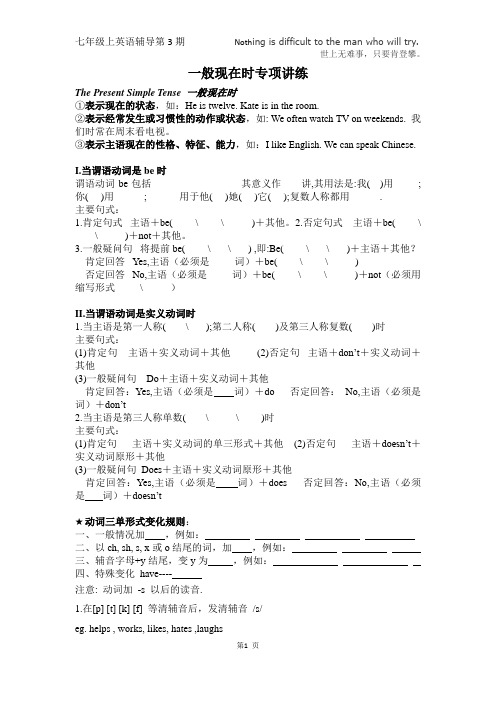
七年级上英语辅导第3期Noth ing is difficult to the man who will try.世上无难事,只要肯登攀。
一般现在时专项讲练The Present Simple Tense 一般现在时①表示现在的状态,如:He is twelve. Kate is in the room.②表示经常发生或习惯性的动作或状态,如: We often watch TV on weekends. 我们时常在周末看电视。
③表示主语现在的性格、特征、能力,如:I like English. We can speak Chinese.I.当谓语动词是be时谓语动词be包括____ _____ _____ 其意义作____讲,其用法是:我( )用_____;你( )用______; ______用于他( )她( )它( );复数人称都用______.主要句式:1.肯定句式主语+be( ____\ ____\ _____)+其他。
2.否定句式主语+be( ____\ ____\ _____)+not+其他。
3.一般疑问句将提前be( ____\ ___\ ___) ,即:Be( ____\ ___\ ___)+主语+其他?肯定回答Yes,主语(必须是_____词)+be( ____\ ____\ _____)否定回答No,主语(必须是_____词)+be( ____\ ____\ _____)+not(必须用缩写形式____\ _____)II.当谓语动词是实义动词时1.当主语是第一人称(____\ ___);第二人称(____)及第三人称复数(____)时主要句式:(1)肯定句主语+实义动词+其他(2)否定句主语+don’t+实义动词+其他(3)一般疑问句Do+主语+实义动词+其他肯定回答:Yes,主语(必须是词)+do 否定回答:No,主语(必须是词)+don’t2.当主语是第三人称单数(____\ _____\ ____)时主要句式:(1)肯定句主语+实义动词的单三形式+其他(2)否定句主语+doesn’t+实义动词原形+其他(3)一般疑问句Does+主语+实义动词原形+其他肯定回答:Yes,主语(必须是词)+does 否定回答:No,主语(必须是词)+doesn’t★动词三单形式变化规则:一、一般情况加,例如:二、以ch, sh, s, x或o结尾的词,加,例如:三、辅音字母+y结尾,变y为,例如:四、特殊变化have----注意: 动词加-s 以后的读音.1.在[p] [t] [k] [f] 等清辅音后,发清辅音/s/eg. helps , works, likes, hates ,laughs2.在浊辅音和元音后,发浊辅音/z/eg. drives, cleans, plays3.在[s] [z] [∫][t∫][dʒ]后,发/iz/rises, wishes, teaches, urges4.在[t] [d]后,发/ts/ /dz/eg. fits, sets, needs5. 其他情况下发[z]eg. plans, cries, shows闯关练习一、写出下列动词的第三人称单数形式。
【教育资料】上学期七年级英语(第3周)组合训练学习精品

2019-2019学年上学期七年级英语(第3周)组合训练【完型填空】Gao Junjie is a student __1__ Class 12, Grade Seven. He likes football very __2__. He often plays it after school. And he often goes home__3__ by bus. His home is not__4__the school but his mother doesn't worry 5__ him.One Sunday morning Gao Junjie goes to a shop__6__his mother. The shop is very__7__. There are many things__8__it. They get some things. Then his mother says to Gao Junjie, "What do you _9_ ?""I want to get a red blouse," he answers. "A red blouse?" asks his mother. "You are a boy. You can't wear a red blouse." Gao Junjie smiles, "The blouse is beautiful, I want to buy it for__10___." “Oh,dear son, I love you!”his mother says.1. A. at B. of C. on D. for2. A. good B. fine C. well D. much3. A. early B. back C. late D. soon4. A. near B. in C. on D. to5. A. for B. with C. about D. at6. A. to B. from C. on D. with7. A. small B. big C. nice D. good8. A. on B. in C. at D. under9. A. want B. get C. put D. take10. A. you B. me C. her D. I【阅读理解】APeople are busy working every day, so they do not have a lot of time to do exercise. As a result(结果),many people become too fat or too thin: To keep our bodies healthy, please do sports every day.There are many kinds of sports. Bending(弯腰) and stretching(伸展) help us move easily. Before we playball games or swim, it is better for us to do bending and stretching exercises first. This kind of exercise is warmup exercise. Running is also a good exercise. If we cannot run fast, we can jog. Jogging means running slowly,Again, before we run or jog, we must do warm-up exercises. Also, we should not run or jog in busy streets. The air there is often dirty. Some people like weight lifting(拳重) because it can make their bodies strong. Also,we need to do somewarm-up exercises before weight lifting.1. __________makes many people too fat or'too thin.A. Eating or drinking too muchB. Having no time to do exerciseC. Doing mote exerciseD. Reading at home2. __________are' called warm-up exercises.A. Playing ball gamesB. SwimmingC. Bending and stretchingD. Weight lifting3. Why do people like weight lifting?A. Because it can make them work well.B. Because it can make them thin.C. Because it can make their bodies strong.D. Because they don't like other exercise.4. Which of the following sentences is RIGHT according to the passage? .A. Jogging means running quickly.B. Busy streets are not good places for running.C. Weight lifting can help us move easily.D. We only need to do some warm-up exercises before weight lifting.BIt was another day to jump rope in gym class. Lynn and Mike turned the long rope in big, slow circles. The whole class hurried to get in line to wait for their turn to jump. Millie stood at the back of the line and frowned.Nick went first. He watched the rope and ran in at just the right time. Everyone counted. He made it all the way to 30 jumps. One after another, the kids watched the rope, ran in and jumped. Then it was Millie’s turn. She watched the rope go around and around, but she didn’t move. She felt like everyone was looking at her.Millie’s friends cheered: “G o, Millie, go!”Millie’s face turned red. At last, she gave it a try, but she failed.The truth was that Millie had been jumping rope at home every day. With a short rope, she could jump 100 times without missing. She just didn’t how to run in and start jumping with a long rope. Since she was the only kid on her street, there was no one to help turn the long rope.Just then, Ms. Miles, the gym teacher, brought out a bunch of short jump ropes.“Let’s see how long each one of you can jump without missing.” she said as she gave each student a short rope. “Ready, set. Go!”Millie smiled for the first time ever in gym class. As she jumped, she sang rhymes quickly to herself.After a while, Millie realized that everyone was cheer ing. “Go. Millie,go!”She was the only one still jumping rope! The surprise almost made her miss a step, but shekept going. When at last she was too tired to go on, she stopped. The whole class cheered. Everyone was looking at her and smiling. Millie smiled back!5. Which word is the opposite of the underlined word frowned?A. Sat.B. Hid.C. Smiled.D. Cried.6. What problem did Millie have at the beginning of the story?A. She didn’t have any friends in her class.B. She felt sad because Nick made fun of her.C. She didn’t know the cheers that the other kids knew.D. She didn’t know how to start jumping with a long rope.7. Why did Millie smile for the first time in gym class?A. She did something well at last.B. She knew the class would cheer for her.C. She thought that she was going t make a friend.D. She believed that she would be the winner of the contest.8. Which sentence can be put in the empty box?A. The class decided to play baseball.B. Millie was the last one still jumping rope.C. Nick won the rope-jumping contest.D. Millie tried to hide in the back of the line.9. How might Millie feel when she stopped jumping at last?A. ProudB. Bored.C. Mad.D. Silly【阅读表达】My name is Paul Miller. I was too fat before, but now I do not have this problem. My doctor tells me to jog(慢跑). So early every morning I run for two miles before breakfast. I do not run fast, but I do not stop to rest.People call me a jogger. There are many joggers on my street. We often run together in the park or along the road. Jogging helps to keep .us strong and healthy.Jogging is very popular in the United States. People like to feel well and look nice. Some people do not jog, but they do not get fat. They work hard on their jobs and they do not need to run before they go to work.Do you want to jog? Go to your doctor first. Your doctor can tell you something about jogging. My doctor tells me to eat only three meals(三餐) a day. I feel healthy and my doctor is happy because I jog every day and I do not eat anything before or after meals.1. Who tells Paul Miller to jog?2. Where do people often jog?3. What should you do first if you want to jog?【书面表达】针对大部分学生现状,英语课上同学们就“Do we need to do sports?”这一话题展开调查。
七年级 英语 第三周公开课教案教学设计课件案例试卷

七年级手动选题组卷(二)一、完形填空Hello, everyone! Do you 26 SOS student club? Yes? I’m a member (成员) of the 27 . Now let me tell you something about it.The purpose (目的) of SOS student club is to help 28 . Some students think 29 homework is too difficult and they can’t 30 it. They can ask the members of the club 31 help. Some students like volleyball, 32 they can’t play it. They can ask us to teach them. Some students can’t get on well with (和……相处融洽) others and they are not 33 . They can talk with us.Are you free after school? Do you want to be 34 to others? If your answer is yes, come and join us. We need five new members. Please 35 us at **********************.( )26. A. see B. find C. know D. join ( )27. A. club B. party C. festival D. family ( )28. A. parents B. students C. grandparents D. friends ( )29. A. our B. his C. my D. their ( )30. A. excuse B. like C. finish D. spell ( )31. A. on B. for C. of D. about ( )32. A. or B. but C. because D. so( )33. A. happy B. healthy C. tidy D. late ( )34. A. cool B. busy C. right D. useful ( )35. A. call B. thank C. e-mail D. meet二、阅读理解Hello, I’m Peter. I come from Japan (日本). I can speak a little English and French (法语). But I can’t speak Chinese. I get up at 6:00 and go to school at 7:30 in the morning. I like P.E. best at school. It is exciting. I don’t like mat h. I think it is difficult and boring. I want to visit China. I want to learn kung fu.My name is Jill. I come from the USA. I’m 13 years old. I go to school at 7:40 and I go home at 5:00 in the afternoon. I have lunch at school. I like music best. It is relaxing. I want to join the music club.I’m Mark. I’m from England. I can speak English and a little French, but I can’t speak Japanese. I like art and I want to join the art club. I also like math, because it is interesting and fun.I have a pen friend in China. His English name is Jack. I want to see him one day.( )41. Peter can’t speak_______.A. EnglishB. ChineseC. JapaneseD. French( )42. What subject does Jill like best?A. Art.B. Math.C. Music.D. English.( )43. What club does Mark want to join?A. The art club.B. The English club.C. The music club.D. The basketball club.( )44. _______ comes from America.A. PeterB. JackC. MarkD. Jill( )45. Which of the following is TRUE?A. Jill has lunch at home.B. Peter can’t do kung fu.C. Mark has a pen friend in Japan.D. Mark doesn’t like math, but Peter does.三、词汇运用A) 根据句意,用括号内所给单词的适当形式填空。
初一英语陪练第三单元的第三课时的作文应该

初一英语陪练第三单元的第三课时的作文应该Every one of us has experienced moments of failure in our lives. Whether it's falling short in academics, sports, or personal goals, setbacks are a natural part of the human experience. However, it's not the failure itself that defines us, but rather how we respond to it. In this essay, we'll explore the importance of resilience in the face of failure and how it shapes our character.Failure is inevitable. No matter how hard we try, there will be times when our efforts don't yield the desired results. It could be a poor grade on a test we studied diligently for, a missed opportunity in a competition we trained hard for, or a project that didn't meet expectations despite our best efforts. In those moments, it's easy to feel discouraged and defeated. However, it's crucial to remember that failure is not the end of the road but merely a detour on the path to success.Resilience is the ability to bounce back from failure, to learn from setbacks, and to keep moving forward despite obstacles. It's what separates those who achieve their goals from those who give up at the first sign of adversity. Resilient individuals understand that failure is not a reflection of their worth or abilities but rather an opportunity for growth and improvement.One of the key components of resilience is having a positive mindset. Instead of dwelling on past failures or setbacks, resilient individuals focus on the lessons learned and the opportunities for growth. They approach challenges with optimism and determination, knowing that they have the strength and ability to overcome them.Another important aspect of resilience is perseverance. It's easy to throw in the towel when faced with adversity, but resilient individuals choose to keep pushing forward. They set new goals, develop a plan of action, and work tirelessly towards achieving them. Even when faced with setbacks or obstacles, they refuse to give up, knowing that success is often just around the corner.Furthermore, resilience involves seeking support from others when needed. No one can navigate life's challenges alone, and having a strong support system can make all the difference in times of adversity. Whether it's friends, family, teachers, or mentors, resilient individuals surround themselves with people who believe in them and encourage them to keep going, even when the going gets tough.In conclusion, failure is a natural part of life, but it doesn't have to define us. By cultivating resilience, we can learn to bounce back from setbacks, grow stronger in the face of adversity, and ultimately achieve our goals. So the next time you encounter failure, don't let it discourage you. Instead, embrace it as an opportunity to learn, grow, and become the best version of yourself.。
七年级英语第三周预案
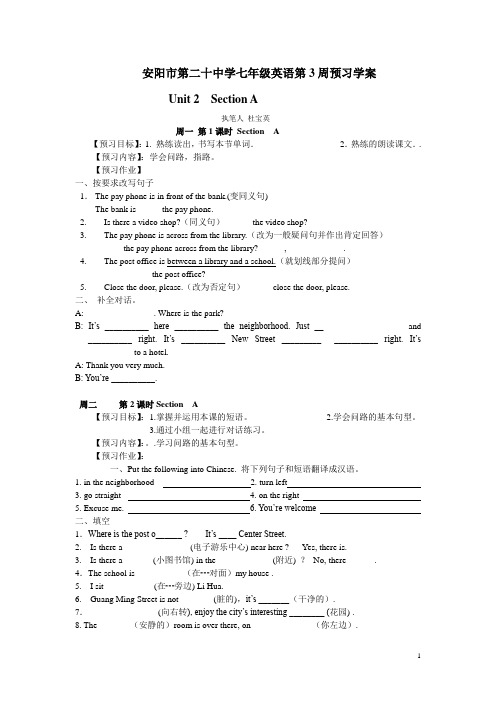
安阳市第二十中学七年级英语第3周预习学案Unit 2 Section A执笔人杜宝英周一第1课时Section A【预习目标】:1. 熟练读出,书写本节单词.2.熟练的朗读课文..【预习内容】:学会问路,指路。
【预习作业】一、按要求改写句子1.The pay phone is in front of the bank.(变同义句)The bank is _____ the pay phone.2. Is there a video shop?(同义句)______ the video shop?3. The pay phone is across from the library.(改为一般疑问句并作出肯定回答)______ the pay phone across from the library?______, ______ ______.4. The post office is between a library and a school.(就划线部分提问)______ ______ the post office?5. Close the door, please.(改为否定句)______ close the door, please.二、补全对话。
A: ________ _______. Where is the park?B: It’s __________ here __________ the neighborhood. Just _________ __________ and __________ right. It’s __________ New Street _________ __________ right. It’s __________ to a hotel.A: Thank you very much.B: You’re __________.周二第2课时Section A【预习目标】:1.掌握并运用本课的短语。
七年级英语上册第3周周演练
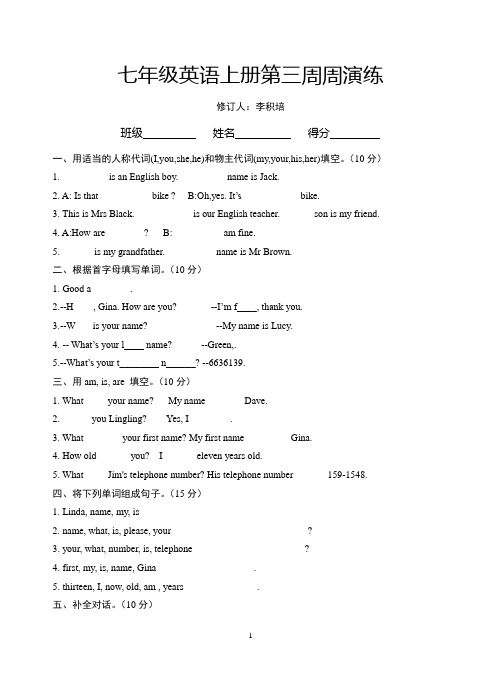
七年级英语上册第三周周演练修订人:李积培班级姓名得分一、用适当的人称代词(I,you,she,he)和物主代词(my,your,his,her)填空。
(10分)1. _________ is an English boy. _________ name is Jack.2. A: Is that __________ bike ? B:Oh,yes. It’s ___________ bike.3. This is Mrs Black. ___________ is our English teacher. ______ son is my friend.4. A:How are _______ ? B:__________ am fine.5. ______ is my grandfather.__________ name is Mr Brown.二、根据首字母填写单词。
(10分)1. Good a________.2.--H____, Gina. How are you? --I’m f____, thank you.3.--W___ is your name? --My name is Lucy.4. -- What’s your l____ name? --Green,.5.--What’s your t________ n______? --6636139.三、用am, is, are 填空。
(10分)1. What ____ your name? My name _______ Dave.2. ______you Lingling? Yes, I ________.3. What _______ your first name? My first name _______ Gina.4. How old ______ you? I ______ eleven years old.5. What ____ Jim's telephone number? His telephone number ______ 159-1548.四、将下列单词组成句子。
- 1、下载文档前请自行甄别文档内容的完整性,平台不提供额外的编辑、内容补充、找答案等附加服务。
- 2、"仅部分预览"的文档,不可在线预览部分如存在完整性等问题,可反馈申请退款(可完整预览的文档不适用该条件!)。
- 3、如文档侵犯您的权益,请联系客服反馈,我们会尽快为您处理(人工客服工作时间:9:00-18:30)。
初一同步辅导(英语)
1. person
2. cheerful
3. hard-working
4. patient adj.
5. probably adv. 很可能
6. forget
7. smell
8. care
9. miss
11. laugh
12. remain
13. strict
14. encourage v. 鼓励
15. support n.[U]
二、重要短语
1. She takes time to help her child.
2. I will never forget the taste, and the smell as well.
3. My grandma took care of my family.
4. She often tells jokes to make me laugh, but she never makes fun of others.
5. be full of
6. Never give up, and you
7. Sometimes he has to work all day and all night, but he still finds time to help me.
8. Mother Day is the time for us to say
三、重要句型
1. My grandma was a short woman
定冠词
一、用
三、用在独一无二的名词前。
不定冠词的用法用在元音音素(元音音标)之前。
、物质名词和抽象名词等不可数名词前。
撰写人:精锐教育英语名师-詹海霞
精锐广东省区英语教研主管,毕业于国家重点大学,英语教育专业。
扎实的英语专业基本功,12年的初高中毕业班教学经验和1对1个性化辅导经验,熟悉广东高中、广州初中小学及深圳初中英语教材,对广东高考及广州深圳中考的英语考点、出题方略有全面系统的研究。
善于和学生沟通,引导学生去发现解决问题的突破点;她的课堂气氛轻松、愉悦、生动、有趣;强调举一反三的思考历程,知识讲解通俗易懂,深入浅出;注重学生学习能力和学习习惯的培养。
她的英语单科上的教学成绩,高考学员最好成绩143分,130分以上达到85%以上;中考英语成绩130分以上的学生达到所带学员的100%。
一直认为教学有法,教无定法。
教学是最富有创造性的工作。
